Bro. Seriously, Bro.
Change of plans. The first two episodes of Hawkeye will drop November 24 on Disney+.
Change of plans. The first two episodes of Hawkeye will drop November 24 on Disney+.
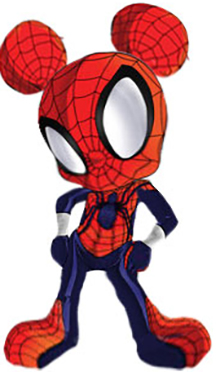 In this very space last week, I suggested there was a reason Marvel’s sales are off that is in addition to the negative reader reaction to such events as Civil War 2 and Secret Empire.
In this very space last week, I suggested there was a reason Marvel’s sales are off that is in addition to the negative reader reaction to such events as Civil War 2 and Secret Empire.
Let’s spread some numbers around. Buying into these mega-events is expensive. Each consists of dozens and dozens of comics — mini-series, tie-ins, one-shots, and so on. Each event takes about 50 or 60 hours to read in their entirety. The post-event comics come out after that, and you might be compelled to check out a few of the ongoing titles where the event changed the characters therein, although Marvel usually abandons those changes around the time the next relevant movie comes out. That’s more money and more time.
The whole thing takes the better part of a year to unfold; longer, as these days each Marvel event tends to segue into the next. You’ve got to work hard and spend a lot of money to complete a satisfying story, even if – as in the case for many with Civil War 2 and Secret Empire, you didn’t find the story all that satisfying.
However, for roughly the price of three individual comic books you can buy a ticket to the latest Marvel movie and get what is usually a satisfying experience — and your friends can join you in that experience. Of course, one should add the cost of an overpriced box of Snow Caps or some such to the tab.
You can watch as many Marvel teevee shows as you can absorb, and many of them are quite entertaining. Or if you want, you can wheel a cooler filled with snacks and drinks into your bathroom, bring in a tablet or a laptop computer, and stream an entire season of one of Marvel’s many, many Netflix series. As long as nobody else needs that toilet, you’re in superhero heaven with a story complete with a beginning, a middle and an end. I, for one, found the recent Marvel’s The Defenders to be very entertaining. Your opinion might differ, but it really shouldn’t.
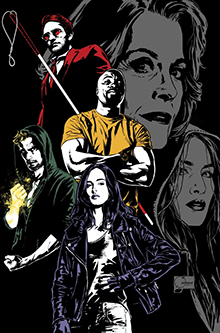 If you’re already a Netflix subscriber, it’s free. If not, well one month of Netflix costs a hell of a lot less than one week’s worth of the current Mighty Marvel Event and you get enough other Netflix shows and movies to fill the Pacific Ocean. You will spend less time, energy and money following your favorite Marvel media madness than plowing your way through a pile of event comics that are mediocre at best.
If you’re already a Netflix subscriber, it’s free. If not, well one month of Netflix costs a hell of a lot less than one week’s worth of the current Mighty Marvel Event and you get enough other Netflix shows and movies to fill the Pacific Ocean. You will spend less time, energy and money following your favorite Marvel media madness than plowing your way through a pile of event comics that are mediocre at best.
So, I ask you this: even this particular competitive environment… who needs to buy all those comic books? And maybe that’s okay by Marvel’s owner, the Mickey Mouse corporation. They understand how to make and how to market movies and video. This comic book stuff goes against everything the bean-counters learned in MBA school – as far as those suits are concerned, everybody in the comics racket talks like Bizarro Number One.
Indeed, the profit of Marvel’s new comic book output for an entire year is dwarfed by the profit from the last Avengers-themed motion picture alone — even if those publishing profits had somehow mysteriously doubled.
I’m not suggesting Disney might not want to publish new comics, but as a return on investment, those resources might be more profitably allocated to the media side.
Shhhh! Don’t tell the Mouse! He can be a real rat, and rats don’t eat staples.
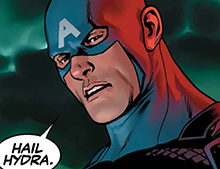 Many wags think someday Mr. and Ms. Consumer will shout enough is enough and demand superhero shows be replaced by… I dunno, maybe westerns or something equally trendy. I’m sure we won’t be seeing half-billion-dollar cape flicks in the theater with the near-monthly frequency we’re seeing now, but who knows? We’ve always had superhero movies and superhero stories, from the Scarlet Pimpernel to Sherlock Holmes to Zorro to Tarzan. The only question is quantity.
Many wags think someday Mr. and Ms. Consumer will shout enough is enough and demand superhero shows be replaced by… I dunno, maybe westerns or something equally trendy. I’m sure we won’t be seeing half-billion-dollar cape flicks in the theater with the near-monthly frequency we’re seeing now, but who knows? We’ve always had superhero movies and superhero stories, from the Scarlet Pimpernel to Sherlock Holmes to Zorro to Tarzan. The only question is quantity.
Does Disney care? Well, they’ll say they do, but they own all those Disney properties which, these days, includes the Marvel characters, the Star Wars empire, the Muppets, and Pixar. It’s not like they won’t have anything to whenever the superhero trend fades a bit.
Disney did not do much in the way of original Mickey Mouse and Donald Duck cartoons for several decades, and they don’t do all that much with them today. Yet they continue to sell a lot of Mouse and Duck product of all sorts. They do not need to publish Marvel comic books in order to keep Captain America and Groot in the public mind.
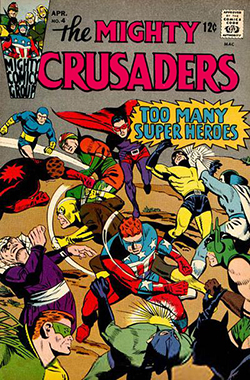 Super-hero movie fans are awash with anticipation. I’ll avoid the obvious jokes.
Super-hero movie fans are awash with anticipation. I’ll avoid the obvious jokes.
A couple weeks ago, executives from 21st Century Fox, the corporate head of 20th Century Fox, met with their counterparts at The Disney Organization, the corporate head of everything named “Marvel” except for Marvel Mystery Oil (see lengthy footnote, below). Evidently, Fox owner Rupert Murdoch needs some cash, as the purpose of the meeting was to see if Disney might be interested in purchasing the Fox movie and teevee operations, save for the sports-related stuff. Said meeting lasted several hours.
Of course, this is not a done-deal. It’s not even a deal. And to the best of my knowledge, there have been no further meetings. However, any such real offer was neither presented nor accepted. Disney appears to be… well, interested. So I guess it was a successful meeting.
 Some fans are salivating over the prospect of an Avengers / X-Men / Fantastic Four crossover movie. Others – including me – firmly believe there’s such a thing as too much. I define too much as the maximum number of characters one could put in a 150-minute movie before they squeeze out an understandable and entertaining story. Avengers: Infinity Wars already sports at least 27 costumes, and that’s not counting Stan Lee.
Some fans are salivating over the prospect of an Avengers / X-Men / Fantastic Four crossover movie. Others – including me – firmly believe there’s such a thing as too much. I define too much as the maximum number of characters one could put in a 150-minute movie before they squeeze out an understandable and entertaining story. Avengers: Infinity Wars already sports at least 27 costumes, and that’s not counting Stan Lee.
What comes to my (admittedly diseased) mind is the stateroom scene from the otherwise somewhat overrated Marx Brothers movie A Night At The Opera. It’s phenomenal. It’s hilarious. And it runs four minutes and four seconds. Stretch that out to 150-minutes and, well, “Tain’t funny, McGee.”
Some are concerned that a Disney takeover will result in fewer Marvel super-hero movies. I respectfully disagree: the marketplace will determine how many Marvel super-hero movies it will support in any given year. It doesn’t matter how many studios split up that pie – it’s the overall size of the pie that matters.
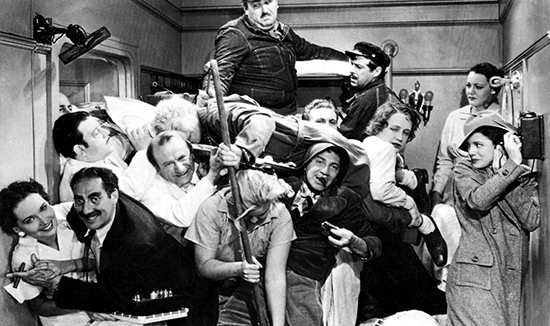
I think what many of us want is to see the quality of the Marvel Studios movies subsume the quality of the average Marvel movie made by Fox. That would be nice, and it worked for Columbia when they “hired” Marvel Studios to take over the production of the Spider-Man franchise.
But the inside pressure to make Avengers / X-Men / Fantastic Four crossover movies would be inevitable and, I think unstoppable. It addresses every stupid marketing philosophy that Hollywood has embraced for decades.
Shirley Temple said it best. “If you eat too much, oh, oh, you’ll awake with a tummy ache.”
Pop Culture Trivia: In case you never heard of Marvel Mystery Oil and you think I made it up as some sort of twist on Marvel Mystery Comics, well, thanks for the compliment but, no, it is a real thing.
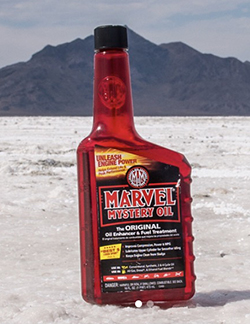 After World War I – you know, the great war – a guy named Burt Pierce invented the “Marvel Carburetor.” It was so successful it was deployed to roughly 80% of all vehicles. Unfortunately, they suffered from a clogging problem due to the high-lead content of the gasoline used at the time (and, in fact, up to about 40 years ago). So, in a blast of innovation so powerful it would have knocked Andy Granatelli’s socks off, Pierce came up with a lubricant that would allow him to continue to sell his Marvel carburetors. Why he named it Marvel Mystery Oil was the matter of some debate.
After World War I – you know, the great war – a guy named Burt Pierce invented the “Marvel Carburetor.” It was so successful it was deployed to roughly 80% of all vehicles. Unfortunately, they suffered from a clogging problem due to the high-lead content of the gasoline used at the time (and, in fact, up to about 40 years ago). So, in a blast of innovation so powerful it would have knocked Andy Granatelli’s socks off, Pierce came up with a lubricant that would allow him to continue to sell his Marvel carburetors. Why he named it Marvel Mystery Oil was the matter of some debate.
Did Pierce’s goo influence Timely (a.k.a. Marvel) Comics’ publisher Martin Goodman? Well, the stuff was very popular and it continues to be marketed today, but against massive competition.
The company was headquartered in Port Chester New York along the Connecticut border; back then you could throw a rock in any direction and hit somebody involved in the comics business. However, the oil company moved to Port Chester in 1941, more than a year after the comic book titled “Marvel Comics” changed its name to Marvel Mystery Comics.
Like much of the planet, I saw the new Guardians of the Galaxy movie this weekend. Like a smaller percentage of this group, I saw it with a friend who isn’t into super-heroes.
Let me be clear. She isn’t opposed to super-heroes. It’s just that they are not her genre.
Still, she had heard good things about it from people at her job, and she was visiting from out of town and wanted to be a good guest, and it was pouring rain and there weren’t a lot of other activities available to us, so we went.
She loved it. She was completely knocked out by it. The whole experience put her through an emotional wringer.
I don’t think she’s about to become a super-hero fan, but I think there are reasons that super-heroes reach us emotionally in ways that other genre fiction does not (and vice versa). In the process of explaining what I mean, there may be SPOILERS about this particular movie. I don’t think any will ruin your enjoyment, but I don’t know your tolerance. Be warned.
There have been a tremendous number of movies in the last few decades about fathers and sons. I blame Steven Spielberg, but I’m sure you can come up with a list of your own. And I get it. We imprint on our parents for every other relationship we have. With the increase in the divorce rate over the last several decades, as well as the stress on the family caused by income inequality (and loads of other reasons that we don’t have time for right now), lots of people feel estranged from their fathers.
Most movies that play with this issue, especially those by the aforementioned Mr. Spielberg, usually find a way to show that Daddy Really Loved You All The Time. And I hope that’s true, for Steven and for you.
But it isn’t for my friend. She had to leave home at 14, and over the next five decades her parents resisted every attempt she made at reconciliation. The only way they would accept her is if she gave up her own identity and lived the life they expected.
Like Ego, my friend’s father felt that she could do what he wanted or she could be dead.
At the same time, my friend was lucky enough to find a father figure. This man didn’t kidnap her from her home and use her to commit acts of piracy, but he found a place for her and made her feel worthwhile. She didn’t learn to command a spaceship, but she can play a wicked game of poker.
Because Guardians is a super-hero movie, there are epic space battles, exotic aliens, amazing special effects and fantastic scenery and costumes. I think these fantastic elements actually make it easier to find oneself in the story. Our inner infant feels parental abandonment and betrayal as world-destroying events. Watching worlds actually get destroyed is the ultimate catharsis.
After all the explosions, we are left with a new family. Unlike my friend’s birth family, these people choose to stay together, to love each other not despite their flaws but because of them. They take care of each other without even thinking about it, because that’s how real families work. Whether the threat is a blob monster, an unplanned pregnancy, divorce or unemployment, we find our real family through these crises. DNA doesn’t matter as much as commitment.
I don’t mean to suggest that Marvel Studios is a substitute for a good therapist, or that we can stop worrying about our kids as long as they can go to the movies. We still need to do the work. Still, I’ll take all the insight I can get, whatever the source.
I’m now waiting to see how well Wonder Woman deals with mothers and daughters. I doubt Hippolyta berates Diana about her weight as much as my mother did to me.
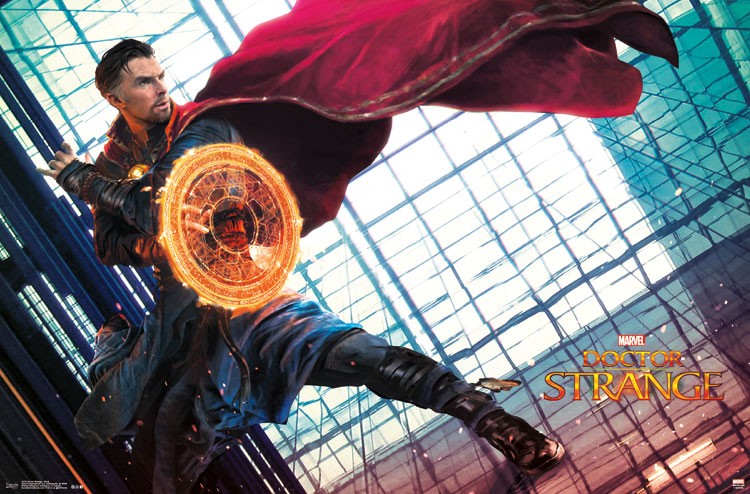
I assume at some point in the future of the Marvel Cinematic Universe we’re going to come across a threat that unites every character in one movie to fight against it in some budget-busting assembly of talent. I am starting to dread this moment because between Tony Stark, Peter Quill, Scott Lang, and now Stephen Strange, I can’t imagine anything could ever get done between giving all four of them chances to show how little they care about anything that happens in favor of getting in some quip or another. Ironic detachment has become the house style in the MCU, and I’m not sure why Doctor Strange was my breaking point but it was. I’m sick of people saving the world by not caring about it.
It’s not that Benedict Cumberbatch is the problem with Doctor Strange. I found him surprisingly acceptable playing a native New Yorker. He isn’t bad at doing pithy dialogue and this might be projection on my part because he’s English but he’s masterful at appearing above it all. He does a good job climbing over the mountain of unlikability the script puts in his path. Honestly, I’m not sure at what part of “arrogant doctor crashes his supercar while rejecting pleas from sick people to get help” is supposed to make us think he’s a good guy, but his subsequent petulant rejection of all of the advice of his doctors so he can regain the use of his hands so he can go back to being a jerk of a surgeon doesn’t do it either. Stephen Strange is an unlikable crater in the middle of Doctor Strange, but Benedict Cumberbatch is just reading the words off the page.
I don’t like Tilda Swinton as The Ancient One. I don’t like that she’s playing an Asian man and even though they go out of the way to say she’s Celtic, there’s nothing she does in the entire film that isn’t out of the mystical Asian man playbook. I think it’s cowardly that Marvel changed the character from Tibetan so that they could have an easier time accessing the Chinese film market. All the talk of censorship I’ve seen in media these past few years— we get actual government intervention in a movie, and so few people seem to notice.
The rest of the cast is great. Chiwitel Ejiofor is too good an actor for the small part this movie asks of him. He wrestles with his morality over the course of this film and you can see the conflict on his face and in his posture in a way you just don’t see in genre films. He’s deserving of more, and I trust if we get a sequel we’ll get more of him. Benedict Wong is also excellent in a small part. He has a great physicality in a movie dominated by bodies skinnier than a life dedicated to martial arts would suggest. He is the focus for much of the humor in the second act and he carries it well. Mads Mikkelsen wouldn’t have been my first choice for a magical martial arts bad guy but I’m thrilled to have been proven wrong. Because of the magic roots (and the liberal use of stunt doubles) it’s not like he has to carry any of the difficult work himself, and it gives us a gifted actor skilled at playing menaces to carry the heavy weight a villain must shoulder in a superhero film. The best part of the entire film is a quick comedic exchange between Cumberbatch and Mikkelsen, and I’m not sure anyone but Mikkelsen could have made it work.
The story is as predictably lifeless as one would expect from a superhero origin story these days. Bad thing happens, person gets extraordinary power, some sort of betrayal requires that power to be directed against evil, and then there’s a new status quo. I’ve seen this movie dozens of times now and there’s nothing new or exciting about the way it’s written up here. The been-there-done-that feeling also extends to the special effects. I’ve read rave reviews of the visual effects and while they’re nice, there’s nothing here I haven’t seen in Inception or The Matrix franchise. While they’ve turned those visual concepts up to 11 this time out it didn’t particularly impress me; I’m not looking for more and bigger with effects as much as I am smarter and more effective. Doctor Strange looks like someone put a kaleidoscope in front of the projector after it had already been shot rather than having a coherent design.
It must seem like I didn’t like Doctor Strange and that honestly isn’t true. Marvel Studios has gotten very good at making these films and it’s almost impossible to sit through one and not be entertained. I’m just starting to see the strings a little more, the same old things, and the clichés that dominate these movies particularly the origin stories. I had a good time watching the movie but it’s not fresh like Iron Man was; it feels more like watching a movie where a police officer has only one day until retirement. Perhaps as we get in to a round of sequels we’ll see a lot less of this, but until then I’m going to be writing a lot more reviews complaining about a movie that’s honestly above average.
One of the only things we love more than Marvel movies….Benedict Cumberbatch.
The Marvel Cinematic Universe has been chugging along for the past eight years. For the most part, almost all of their films are considered hits with the fans. Their most recent offering is up to par for Marvel, pleasing comic and non-comic fans. In fact, there is only one big glaring mark against Marvel – for me at least. Where are my female-led movies?
We are talking eight years of a major blockbuster franchise. In the MCU, there is only one central female character, Black Widow, that has been in it from almost the beginning, and a handful of female supporting characters, like Pepper Potts, Sif and Jane Foster. You can make the argument that Scarlet Witch is now a central figure but she is still very new to the universe.
Before you start yelling at me, yes I know there is a female-led movie on the Marvel schedule. Captain Marvel is set for March 8th, 2019. So almost three years from now. So, eleven years into the MCU, we finally get a female-led movie that fans were asking for four years ago. But even before that, since the moment Scarlett Johannson appeared in Iron Man 2, fans have been asking for her to get a solo film. Or toys (or as I liked to put it, any recognition at all), as in the Black Widow flash mobs in 2015.
Kevin Feige, head of Marvel Studios, has finally gotten the hint. He told Deadline that they are committed to doing a Black Widow movie, after the current slate of films is done. So, maybe early 2020s, if we are lucky.
Traditionally, movie studios like to point to underperforming female-led movies and blame the gender of the character for a bad box office rather than any other issues, like script, direction, plot, editing, set design, general stupidity of the film. Really, who is to blame for Catwoman: Halle Berry or the writers/director/producers? Meanwhile, any high-grossing female-led film is ignored as a happy accident.
What it looks like to me is that Marvel is waiting to see how Wonder Woman does first. BvS might have been horrible, but Gal Gadot’s few minutes on screen really did the character justice. If Wonder Woman can strike gold with a lesser known actress for a troubled DC Cinematic Universe, then things will look brighter for Black Widow. Then on to Ant-Man and Wasp in 2018, to see how fans react to a female character in the title of the film. Finally, if Captain Marvel does well in 2019, I think Black Widow will be greenlit.
I don’t doubt Feige’s sincerity in wanting to do a Black Widow solo film. He has helped mold the character into a rock for the Avengers to lean on. To take her to the next level would be a dream. However, Marvel is traditionally stingy with pay and Scarlett Johannsson has proved her box office worth time and again. She can ask for a larger sum and it is totally justified. With Captain Marvel, they can pick a lesser-known actress and pay her less money for the honor career boost of being in a Marvel film.
The Marvel Cinematic Universe has given us a lot – most of it we didn’t even know we wanted until we had it! (Guardians of the Galaxy, am I right?) Still, fans have been asking from the second movie in for a Black Widow film. We have stuck with you this far Marvel, don’t let us down.
This past weekend Captain America: Civil War raked in an impressive two hundred million dollars. That feat was made more impressive by the fact that the movie had not come out in the United States yet or even China, the second largest market for Hollywood movies. The past week has also seen a resurgence in public outcry against Tilda Swinton’s casting as The Ancient One in Doctor Strange which had at least one person attached to the film citing casting as something that would impact the film’s performance in foreign markets.
China’s dominance in the Hollywood market is a fairly new occurrence. It was only a few years ago when China surpassed Japan to become the second largest market for these movies, with eyes on becoming the largest. We’ve seen some of the effects of this development already at Marvel with the handling of Iron Man 3. So what does this mean for other movies and specifically comic book blockbusters?
Going back to Doctor Strange, screenwriter C. Robert Gargill specifically stated that the Ancient One could not be played as a Tibetan (as the character is in the comics) out of fear how the Chinese could react and adversely affect box office revenue. Now he has since come out and said that his statement was not appropriate, that he did not work on the original draft and he was brought in later, and apologized for making the remarks.
That said, he may have been speaking some truth. If studios are going to be targeting overseas markets they should be empathetic to them. The idea of being more empathetic in amongst itself is not a bad one, even if the end goal is to get you to spend money, but when it comes to Tibet, it’s hard to argue that empathy is at the heart of the matter.
But does that explain why The Ancient One was cast white?
Yes and no. The explanation given explains that they didn’t cast someone Tibetan for sure. Casting someone else of another Asian background would have also fed into stereotypes and the notion that these actors and actresses can be swapped and mixed despite the fact that those in the Philippines have a very different life and customs than those in China and so forth, which is not very good to do either.
I feel that Marvel Studios casting Tilda Swinton was at least an attempt to do the right thing. Women are so rarely, if ever, cast as being the old martial or magical master that teaches a man. That a woman has been cast in this role should be a good thing. Perhaps if the character in question was not from Tibet, this wouldn’t be as much of a hot button issue for people. And it’s understandable that it is. We are talking about genocide.
Honestly, as screenwriter C. Robert Gargill states, every decisions regarding The Ancient One is a bad one.
How did we end up with all these characters that seem problematic today? Between Doctor Strange and Iron Fist as of late, this would seem to be a Marvel problem, however this is not exclusively a Marvel Studios problem, or even just a mainstream comics problem (remember the bomb that was 2013’s The Lone Ranger?). These recent film adaptations of properties decades old, older than the target demographics, is revealing a lot about ourselves and our past.
Subject matters, characters, and ideas that we may find difficult to defend or even straight up repulsive now were not necessarily the case in the 60s, let alone the 30s and further back. The internet has made our world smaller. It’s making us aware of the sort of plights that we otherwise would not have been just a couple of decades ago. As a result, studios need to work on updating many of these properties that they would like to use as they have the benefit of name recognition to get butts in the seats, but these efforts have proved to involve a steep learning curve that can risk financial losses.
Marvel Studios, to their credit, has Black Panther and Captain Marvel slated for release before the end of the decade, and have been working on diversifying the characters they use. DC will be releasing a Wonder Woman and a Cyborg movie as well. That’s not to say that these movies may not also have their own hiccups and shortcomings, but it’s an acknowledgement that audiences are changing. Not just that audiences are changing here in the United States, but now that foreign markets are growing in importance to Hollywood, audiences around the world get a seat at the table, and Hollywood increasingly needs movies the rest of the world can enjoy as well. And so far, Marvel seems like they figured that out yet again with Captain America: Civil War.
Last week, Rich Johnston over at Bleeding Cool wrote one of his typically brilliant pieces about how Marvel Studios’ Kevin Feige aced out Marvel CEO Isaac Perlmutter and put to death the Marvel Creative Committee – Alan Fine, Brian Michael Bendis, Dan Buckley, Joe Quesada and others from time to time such as Jeph Loeb and Axel Alonso.
That last bit makes my head hurt. Consciously turning your back on such a gifted, knowledgeable and successful group of people because you think you know how to do it better is not the act of a good businessperson, it’s the act of a megalomaniac.
Rich asks the question “how did Feige manage to strong-arm Disney into this decision?” That’s a fascinating question, as historical inquiries go. I’d like to toss out some comments about the future of Feige Island (Rich’s term; I only steal from the best). To paraphrase the most over-paraphrased phrase in comics, “with great power comes great exposure.”
This is not a prediction, it’s an analysis. Lots of shit will come down the pike. However, this is one of those rare occasions where logic is useful. Sooner or later, Marvel Studios is going to drop a turd. No slight against Marvel; it’s the second law of thermodynamics, although I phrased it somewhat differently. It’s going to happen sooner or later.
The highest dictum of business is “cover your ass.” Once again I shall quote the great Mel Brooks in Blazing Saddles, where he played Governor William J. Le Petomane at his conference table. “We’ve got to protect our phony baloney jobs, gentlemen!”
This is the principle by which business, government, and Hollywood lives and is bound to live. So, when Marvel Studios finally lays that egg, who is going to get the blame? If the buck stops at Kevin Feige’s wallet, who else is there to blame? Ike Perlmutter? Nope; he’s been banished from Feige Island. If Kevin doesn’t get himself a fall guy… then he is the fall guy.
Why the hell would a creative manager void himself of input from the likes of Bendis, Buckley, Quesada, Loeb, Fine and Alonso? Did Feige actually see any of the Marvel Studios product?
How about the balance sheets?
(For a swell time, Google Mel Brooks’ muse Le Pétomane, the stage name of the French flatulist Joseph Pujol. Seriously. You’ll be amazed and delighted… and, probably, a bit disgusted.)